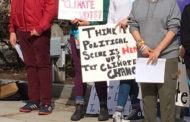By David Vail
David Vail is Professor of economics emeritus, Bowdoin College, and a member of the Economics Policy Network of Citizens’ Climate Lobby.
We’re All in This Together
Climate Solutions Beyond Your Backyard
Submitted by the Volunteers of Portland Citizens’ Climate Lobby

Portland just finished its hottest summer ever. Gulf of Maine waters, among the world’s fastest warming, are far above normal this year. Smoke from West Coast fires is in our skies.
Widening the lens, global warming is undermining survival of the world’s poorest and most vulnerable. As deserts expand, rising seas drown low lying coasts, and tropical forests burn.
The Maine Climate Council is framing a strategy to cut Maine’s greenhouse gas emissions and adapt to inevitable adverse shocks. We need a farsighted state strategy. But since the causes of climate change are global, so must be the solutions, and American leadership is crucial. With a climate denier in the White House, Americans face a stark choice this November.
International climate initiatives have been long on rhetoric but disastrously short on concerted action. As Nobel Prize economist William Nordhaus puts it, “The key agreements, the 1997 Kyoto Protocol and the 2015 Paris climate accord, have relied on voluntary arrangements, which induce free riding that undermine any agreement.”
The United States is the ultimate free rider. We failed to ratify the Kyoto Protocol and, by Trump’s edict, we are exiting Paris. Past failed initiatives make it clear that decisive international action will not happen without American leadership. Other nations have little incentive to impose costly emission cuts on themselves. Meanwhile the USA – by far the world’s largest cumulative emitter – shirks.
3-Part Plan to Solve Global Climate Crisis
The Citizens’ Climate Lobby (CCL) proposes a three part strategy to encourage American energy efficiency and renewable energy innovations. First, a gradually rising fee – or tax – on carbon emissions. Second, tax revenues returned to households as equal dividends, offsetting their higher cost of living. And third, border adjustments – i.e. import tariffs – to prevent exploitation by foreign nations that fail to impose a carbon price on their exporters.
Most economists agree that international action should follow a similar approach. A common carbon emissions tax is no panacea, but it is the most cost-effective, readily implemented – and probably most politically feasible – mechanism to get the ball rolling.
More than twenty nations have carbon taxes. But with tax rates all over the map, businesses and consumers face vastly different costs and incentives. Crucially, there is no common enforcement mechanism to deter cheating by nations that don’t impose a carbon tax, though the European Union is designing a countervailing tariff.
Effective international action faces three challenges where American leadership will be crucial:
- Setting the timetable for carbon tax increases, strengthening incentives while minimizing dislocation
- Designing countervailing tariffs to discourage holdouts
- Allocating carbon tax revenues collected by national governments
These are deeply political choices, but a wealth of economic analysis can help shape effective policies.
Regarding revenue allocation, I would advocate for the CCL’s dividend proposal with an added commitment to global equity. Channeling sixty percent of US revenues to low and middle income American households would offset their higher living costs; and targeting forty percent to vulnerable groups in poorer countries would ease their plight.
We can be proud that Maine is taking climate leadership, but prospects for America spearheading global action hinge on this November’s election – another key reason to vote.





